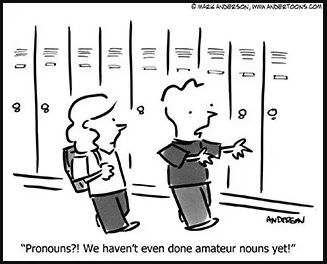|
Having trouble viewing this message? Click here to view it online.
To unsubscribe or change contact details, scroll to the bottom and follow the link.
|



|
How Can They Be Singular?
|
|
The title of our first newsletter this month was How Did They Get In Here? That article looked at careless mismatches of the normally plural pronoun they with a singular antecedent. We suggested simple fixes. But there is more depth to this topic, and in today's newsletter we'll explore the singular they a little further. In two weeks we'll wind up, at least for the time being, our discussion of the singular they, including modern arguments for its use.
Which of the following sentences is incorrect: A) It’s enough to drive anyone out of his senses. B) It’s enough to drive anyone out of his or her senses. C) It’s enough to drive anyone out of their senses.
Those who consider themselves “old school” would likely
consider C incorrect: their is plural but its antecedent, anyone, is singular. Most traditionalists would consider B the
best sentence (despite the clunky his or her), although they would
reluctantly accept A also.
We consider ourselves traditionalists too. But after looking long and hard
at the overwhelming evidence, we cannot in good conscience say that C is
incorrect.
“It’s enough to drive anyone out of their senses” was
written by the celebrated playwright and critic George Bernard Shaw. But
Shaw was no outlier when it came to the so-called “singular they.”
Oscar Wilde: “Experience is the name everybody gives to their
mistakes.” Henry Fielding: “Every Body fell a laughing, as how
could they help it?” Shakespeare: “God send everyone their
heart’s desire.” The King James Bible: “In lowliness of
mind let each esteem others better than themselves.”
Even despite these eminent writers’ words, we know that many of you
are adamant that the plural pronoun they and its variants should
never be used with singular antecedents. Perhaps you will reconsider after
hearing from the language scholars.
• From A Dictionary of Contemporary American Usage (1957) by
Bergen Evans and Cornelia Evans: “The use of they in
speaking of a single individual is not a modern deviation from classical
English. It is found in the works of many great writers.”
• British editor Tom Freeman: “Singular ‘they’ is
over 600 years old, going back into Middle English. Great writers have used
it, including Chaucer, Shakespeare, Swift, Fielding, Austen, Defoe, Byron,
Thackeray and Shaw.”
• The American Heritage Dictionary: “Writers
who choose to use they with a singular antecedent should rest
assured that they are in good company—even if a fair number of
traditionalists still wince at the usage.”
• The irascible Tom Chivers, writing in London’s daily Telegraph: “If someone tells you that singular
‘they’ is wrong, you can firmly tell them to go to hell.”
So do we recommend the singular they? In fact we loathe it. You
will never see the singular they in our blog posts. We stand with
the English scholar Paul Brians, who says in Common Errors in English Usage: “It is wise to shun this
popular pattern in formal writing.” And we admire the passion of the
writer Jen Doll: “Every time I see a singular they, my inner
grammatical spirit aches … The singular they is ear-hurting,
eye-burning, soul-ravaging, mind-numbing syntactic folly.”
Yes. The singular they might not be incorrect, but “not
incorrect” is no one’s idea of an impressive credential.
|
View and comment on this
article on our website.
|
|
Free BONUS Quiz for You!
Friend, because you are a subscriber to the newsletter, you get access to one of the Subscribers-Only Quizzes. Click here to take a Their vs. There vs. They're Quiz and get your scores and explanations instantly!
We will be adding many more quizzes this year to our already substantial list of quizzes. If you have suggestions for topics we have not yet covered, please send us a message at help@grammarbook.com.
|
Hundreds of Additional Quizzes
at Your Fingertips
Subscribe now to receive hundreds of additional English usage quizzes not found anywhere else!
Teachers and Employers
Save hours of valuable time! You may assign quizzes to your students and employees and have their scores tallied, organized, and reported to you! Let GrammarBook.com take the hassle out of teaching English!
"Fun to test my skills."
"The explanations really help ... thanks!"
"I can select the quizzes to assign to my students, and then the results are reported to me automatically!"
|

|
Don't need all the quizzes?
You can now purchase the same quizzes individually for ONLY 99¢ each.
Purchase yours here. |
If you think you have found an error in a quiz, please email us at help@grammarbook.com
|
 |
The Blue Book of Grammar and Punctuation
by Jane Straus, Lester Kaufman, and Tom Stern |
The Authority on English Grammar! Eleventh Edition Now Available
An indispensable tool for busy professionals, teachers, students, homeschool families, editors, writers, and proofreaders.
Available in print AND as an e-Book! Over 2,000 copies are purchased every month!
The publisher of The Blue Book, Jossey-Bass, A Wiley brand, is offering a 35 percent discount for those of you who order the book through Wiley.com. Shipping and tax are not included. Simply go to bit.ly/1996hkA and use discount code E9X4A.
Offer expires December 31, 2020.
|
Wordplay

|
 |
English In A Snap:
68 One-Minute English Usage Videos FREE |
Learn all about who and whom, affect and effect, subjects and verbs, adjectives and adverbs, commas, semicolons, quotation marks, and much more by just sitting back and enjoying these easy-to-follow lessons. Tell your colleagues (and boss), children, teachers, and friends. Click here to watch.
|
|